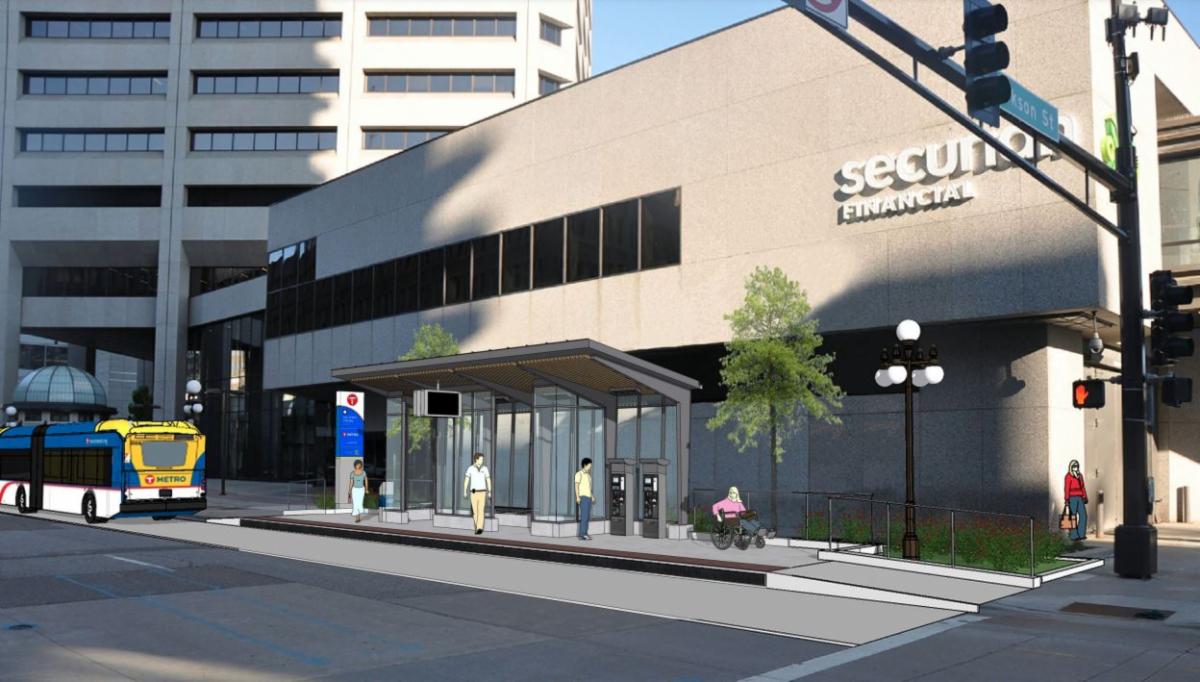Washington, D.C. – The Federal Transit Administration (FTA) is recommending $2.5 billion to help fund the construction or completion of 25 rail, bus rapid transit (BRT), and streetcar projects in 12 states as well as others that earn eligibility in fiscal year 2022.

Minnesota Gold Line BRT station rendering
FTA’s FY 2022 Annual Report on Funding Recommendations includes $1.56 billion for 17 Capital Investment Grants (CIG) Program projects with existing grant agreements, and $461.1 million for eight new CIG projects estimated to be ready for grants in FY 2022. An additional $427.2 million is recommended for other CIG and Expedited Project Delivery Pilot Program projects that may become ready for funding during FY 2022.
First-time recommendations for eight transit projects in five states will award a share of CIG funds to:
- Arizona – $158.12 million for the Northwest Extension Phase II project to extend Valley Metro’s light rail system 1.5 miles from the existing end of line station in Northwest Phoenix to the Metrocenter Mall.
- Minnesota – $239.35 million for the METRO Gold Line BRT project in St. Paul to better connect transit riders traveling along a 10.3-mile corridor on I-94 between downtown Saint Paul and the suburban cities of Maplewood, Landfall, Oakdale, and Woodbury.
- Minnesota – $56.09 million for the Rochester Rapid Transit BRT project to bring BRT service to a 2.6-mile corridor that includes downtown Rochester, Mayo Clinic campuses, commuter lots, and residential neighborhoods.
- Texas – $17.81 million for the Expo Center BRT project to bring BRT service to residents along a 12-mile corridor, connecting East Austin to The University of Texas, downtown Austin, and other major employment areas.
- Texas – $18.28 million for the Pleasant Valley BRT project would bring BRT service to a 14-mile corridor connecting residents of the Mueller neighborhood in northeast Austin to the Goodnight Ranch neighborhood in southeast Austin.
- Washington state – $55.63 million for the RapidRide I Line BRT project in South King County to bring BRT service to suburban communities along a 17-mile corridor between the cities of Renton, Kent, and Auburn.
- Washington state – $75.20 million for the Pacific Avenue/State Route 7 BRT project in Pierce County to bring BRT service to communities along a 14.3-mile corridor between downtown Tacoma and Spanaway.
- Wisconsin – $80 million for the Madison East-West BRT project to provide fast, reliable bus service for residents in a 15.5-mile corridor running along East Washington Avenue, around the State Capitol building, through downtown Madison and the University of Wisconsin-Madison campus, and continuing west on University Avenue to the West Transfer Point or West Towne Mall.
The CIG Program is the federal government’s primary grant program for supporting transit capital projects that are locally planned, implemented, and operated. It provides funding for investments such as new and expanded heavy rail, commuter rail, light rail, streetcars, bus rapid transit, and ferries, as well as corridor-based BRT investments that emulate the features of rail.
